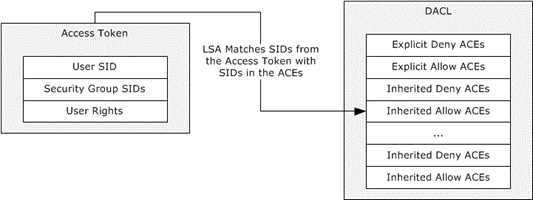

#include <iostream>
#pragma comment(lib, "advapi32.lib")
#include <windows.h>
#include <stdio.h>
#include <aclapi.h>
#include <tchar.h>
bool IsAdmin()
{
//
// check if token is member of the Administrators group
//
SID_IDENTIFIER_AUTHORITY NtAuthority = SECURITY_NT_AUTHORITY;
PSID AdministratorsGroup;
BOOL b = AllocateAndInitializeSid(
&NtAuthority,
2,
SECURITY_BUILTIN_DOMAIN_RID,
DOMAIN_ALIAS_RID_ADMINS,
0, 0, 0, 0, 0, 0,
&AdministratorsGroup);
if (b) {
if (!CheckTokenMembership(NULL, AdministratorsGroup, &b))
b = FALSE;
FreeSid(AdministratorsGroup);
}
return b ? true : false;
}
void main()
{
std::cout << "IsAdmin:" << IsAdmin() << "\n";
DWORD dwRes, dwDisposition;
PSID pEveryoneSID = NULL, pAdminSID = NULL;
PACL pACL = NULL;
PSECURITY_DESCRIPTOR pSD = NULL;
EXPLICIT_ACCESS ea[2];
SID_IDENTIFIER_AUTHORITY SIDAuthWorld =
SECURITY_WORLD_SID_AUTHORITY;
SID_IDENTIFIER_AUTHORITY SIDAuthNT = SECURITY_NT_AUTHORITY;
SECURITY_ATTRIBUTES sa;
LONG lRes;
HKEY hkSub = NULL;
WCHAR cls[MAX_PATH] = _T("");
// Create a well-known SID for the Everyone group.
if (!AllocateAndInitializeSid(&SIDAuthWorld, 1,
SECURITY_WORLD_RID,
0, 0, 0, 0, 0, 0, 0,
&pEveryoneSID))
{
_tprintf(_T("AllocateAndInitializeSid Error %u\n"), GetLastError());
goto Cleanup;
}
// Initialize an EXPLICIT_ACCESS structure for an ACE.
// The ACE will allow Everyone read access to the key.
ZeroMemory(&ea, 2 * sizeof(EXPLICIT_ACCESS));
ea[0].grfAccessPermissions = KEY_READ;
ea[0].grfAccessMode = SET_ACCESS;
ea[0].grfInheritance = NO_INHERITANCE;
ea[0].Trustee.TrusteeForm = TRUSTEE_IS_SID;
ea[0].Trustee.TrusteeType = TRUSTEE_IS_WELL_KNOWN_GROUP;
ea[0].Trustee.ptstrName = (LPTSTR)pEveryoneSID;
// Create a SID for the BUILTIN\Administrators group.
if (!AllocateAndInitializeSid(&SIDAuthNT, 2,
SECURITY_BUILTIN_DOMAIN_RID,
DOMAIN_ALIAS_RID_ADMINS,
0, 0, 0, 0, 0, 0,
&pAdminSID))
{
_tprintf(_T("AllocateAndInitializeSid Error %u\n"), GetLastError());
goto Cleanup;
}
// Initialize an EXPLICIT_ACCESS structure for an ACE.
// The ACE will allow the Administrators group full access to
// the key.
ea[1].grfAccessPermissions = KEY_ALL_ACCESS;
ea[1].grfAccessMode = SET_ACCESS;
ea[1].grfInheritance = NO_INHERITANCE;
ea[1].Trustee.TrusteeForm = TRUSTEE_IS_SID;
ea[1].Trustee.TrusteeType = TRUSTEE_IS_GROUP;
ea[1].Trustee.ptstrName = (LPTSTR)pAdminSID;
// Create a new ACL that contains the new ACEs.
dwRes = SetEntriesInAcl(2, ea, NULL, &pACL);
if (ERROR_SUCCESS != dwRes)
{
_tprintf(_T("SetEntriesInAcl Error %u\n"), GetLastError());
goto Cleanup;
}
// Initialize a security descriptor.
pSD = (PSECURITY_DESCRIPTOR)LocalAlloc(LPTR,
SECURITY_DESCRIPTOR_MIN_LENGTH);
if (NULL == pSD)
{
_tprintf(_T("LocalAlloc Error %u\n"), GetLastError());
goto Cleanup;
}
if (!InitializeSecurityDescriptor(pSD,
SECURITY_DESCRIPTOR_REVISION))
{
_tprintf(_T("InitializeSecurityDescriptor Error %u\n"),
GetLastError());
goto Cleanup;
}
// Add the ACL to the security descriptor.
if (!SetSecurityDescriptorDacl(pSD,
TRUE, // bDaclPresent flag
pACL,
FALSE)) // not a default DACL
{
_tprintf(_T("SetSecurityDescriptorDacl Error %u\n"),
GetLastError());
goto Cleanup;
}
// Initialize a security attributes structure.
sa.nLength = sizeof(SECURITY_ATTRIBUTES);
sa.lpSecurityDescriptor = pSD;
sa.bInheritHandle = FALSE;
// Use the security attributes to set the security descriptor
// when you create a key.
lRes = RegCreateKeyEx(HKEY_CURRENT_USER, _T("mykey"), 0, cls, 0,
KEY_READ | KEY_WRITE, &sa, &hkSub, &dwDisposition);
_tprintf(_T("RegCreateKeyEx result %u\n"), lRes);
Cleanup:
if (pEveryoneSID)
FreeSid(pEveryoneSID);
if (pAdminSID)
FreeSid(pAdminSID);
if (pACL)
LocalFree(pACL);
if (pSD)
LocalFree(pSD);
if (hkSub)
RegCloseKey(hkSub);
return;
}


